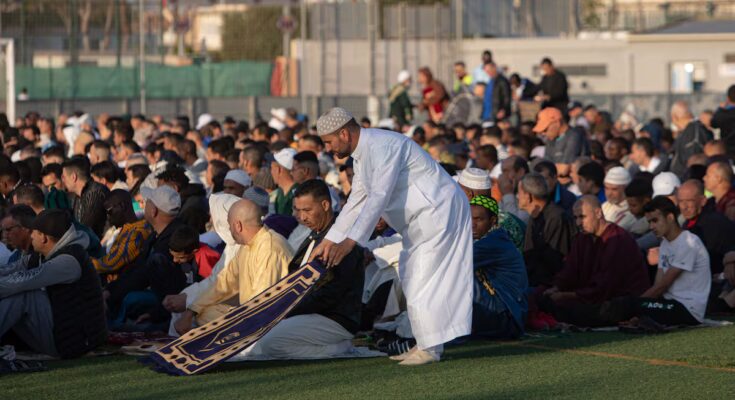The Municipality of Jumilla (Region of Murcia, 27,000 inhabitants) will be able to continue its plan to ban the celebration of religious events by the Muslim community in sports centres. At least for now. Last October, the State Attorney’s Office appealed against the agreement of the entire City Council of the city to modify these uses of the municipal sports spaces and requested the precautionary suspension of the measure, but the Litigation Court Number 6 of Murcia has now rejected this suspension, and it will be the ruling that will resolve the matter on the merits.
On Wednesday the Court made public an order in this regard, in which it does not evaluate the legitimacy or otherwise of the motion approved by the Jumilla plenary session, but limits itself to considering that it is not possible to temporarily suspend what is a mere “request to start the procedures”. The ordinance recalls that what was approved on July 28 in the municipal plenary session was not to ban these religious celebrations, but rather a motion presented by Vox and modified by the PP to, literally, “urge the government team to initiate the appropriate procedures to amend the Regulation of use and operation of municipal sports facilities of 03/21/2013, so that the use of such facilities is exclusively for the sports field and the events and activities organized by the City Council of Jumilla, and not for cultural, social or religious purposes outside the Municipality”.
Vox’s original motion directly called for a ban on prayers that Muslims collectively perform on that faith’s two major holidays: the end of Ramadan (or Eid al-Fitr) and the Feast of the Lamb (or Eid al-Adha). In the town these two prayers, lasting about two hours, were celebrated in the sports centres. The Muslim community in the municipality has around 1,500 faithful. The motion, which had been presented in similar terms in other municipalities, such as the capital Murcia (in that case without success), sparked great controversy, as it occurred a few weeks after the clashes that took place in Torre-Pacheco, including against migrants of Arab origin. However, it was only on 15 October that the State Prosecutor’s Office lodged an appeal, at the request of the Delegation of the Central Government of the Region of Murcia, against this plenary agreement, also requesting its precautionary suspension.
According to state lawyers, the text approved by PP and Vox aimed to limit “the exercise of the fundamental right to religious freedom”, using municipal powers for “ideological purposes unrelated to the general interest”. They also believed that the celebration of these holidays did not alter public order in any way, since they had been established for years. Banning them could have a negative impact on coexistence, and the provisional suspension of the proposal, they underlined, was also necessary because the ruling on this issue will predictably be after those holidays, scheduled for the months of March and May 2026. But the judge does not see the reason to temporarily suspend a complete agreement which “is nothing more than a request to start procedures whose materialization is not recorded, nor is it possible to venture whether they will take place”.
The ordinance emphasizes that, for the moment, the Jumilla City Council has not changed the regulation for the use of sports centers, therefore, until this change occurs, there is nothing to prevent the celebration of Eid al-Fitr and Eid al-Adha next year. For the same reason, he does not consider an alteration of public order foreseeable. And he insists that what the State Attorney’s Office has appealed to is “not the agreement to change the municipal regulations” on sports spaces or the initiation of procedures to make such a change, but rather a simple request from the plenary session to the municipal government which has not materialized. The Court also indicates in this order that it is possible to appeal to the Superior Court of Justice of Murcia, which will be the ruling that will finally rule on the merits of the matter, i.e. whether the plenary agreement represents a “violation of the right to religious freedom, of equality, of the principle of neutrality of the administration or of abuse of power”.


